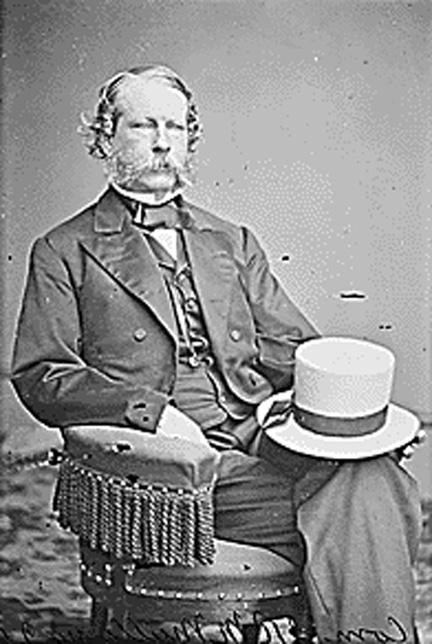
Admiral James Robert Madison Mullany
MULLANY, James Robert Madison, naval officer, born in New York city, 26 October, 1818; died in Bryn Mawr, Montgomery County, Pennsylvania, 17 September, 1887.
He was a son of Colonel James R. Mullany, quarter, master-general, United States army, and entered the navy as midshipman from New Jersey, 7 January, 1832.
He was promoted passed midshipman, 23 June, 1838, and lieutenant, 29 February 1844.
He was actively engaged in the Mexican war, and took part in the capture of the city of Tobasco in June, 1847.
Prior to the civil war he saw much service at sea in almost every quarter of the globe.
From January till March, 1861, he served on the frigate "Sabine" in the protection of Fort Pickens, and in April and May of that year, in command of the gun-boat " Wyandotte," occupied a position in the harbor of Pensacola, in rear of Fort Pickens, which was then threatened by an attack from the enemy, and he assisted in re-enforcing that fort on 12 April, 1861.
He was commissioned commander, 18 October, 1861, and assigned to the steamer "Bienville" in the North Atlantic and West Gulf squadrons, where he remained from April, 1862, till May, 1865, except for a short time, including the battle of Mobile Bay, being frequently under the enemy's fire.
Having volunteered his services for the battle of Mobile Bay, and the " Bienville " not being considered by Admiral Farragut as fit to engage the forts, he was in the action of 5 August, 1864, in command of the "Oneida."
This ship, lashed to the "Galena," was on the side toward Fort Morgan and in the rear of the line of battle, and exposed to a very destructive fire from that fort. Later the "Oneida" was attacked by the ram "Tennessee," which was enabled to rake her. One shot inflicted severe loss on his ship and wounded Commander Mullany in several places, one wound rendering amputation of the left arm necessary.
Until this moment he had directed the movements of both ships, and, stationed in a conspicuous place, encouraged his men as well by his example as by his words. After this the engagement, so far as the "Oneida" was concerned, was at an end.
From April till September, 1863, he commanded a division of the West Gulf squadron, and during" the course of the war he captured eleven blockade-runners of a great aggregate value, and in addition cut out, with boats, two schooners laden with cotton in the harbor of Galveston, Texas From May, 1865, till May, 1868, he was inspector in charge of ordnance in the Brooklyn navy-yard.
He was commissioned captain in 1866, was one of the board of visitors to the naval academy in 1868, and commanded the sloop "Richmond" in the European squadron from December, 1868, till November, 1871.
He was commissioned commodore, 15 August, 1870, and was in charge of the Mediterranean squadron from October, 1870, till November, 1871, and of the Philadelphia navy-yard in 1872-74.
After receiving his rear-admiral's commission, 5 June, 1874, he commanded the North Atlantic squadron till February, 1876, during a part of which time he co-operated efficiently with General William H. Emory and General Philip H. Sheridan, who were successively in command at New Orleans.
He was governor of the Naval asylum, Philadelphia, from 1876 till 1879, when he was retired from active service, and he made, to the close of his life, his home in the last-named city, dying at one of its suburban summer resorts. "No government or people," says one who knew him intimately and well, "ever had a more gallant or faithful public servant ; and he was as modest, as genial, as gentle, and as kind as he was faithful and brave."
Reference: Virtual American Biographies


NH 47632 Commander J.R. Madison Mullany USN
Letter below is from JRM Mullany written in May of 1870






